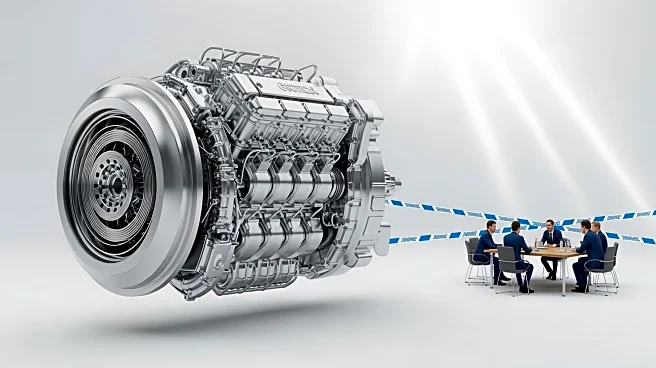What's Happening?
Rolls-Royce has successfully tested the world's first high-speed marine engine powered exclusively by methanol at its Friedrichshafen test bench. This development is part of the meOHmare research project,
which aims to create climate-neutral and environmentally friendly propulsion solutions for the shipping industry. Dr. Jörg Stratmann, CEO of Rolls-Royce Power Systems AG, highlighted the significance of this achievement, noting that no other high-speed engine in this performance class currently runs purely on methanol. The project is supported by the German Federal Ministry for Economic Affairs and Energy and involves collaboration with partners such as Woodward L’Orange and the WTZ Roßlau technology and research center.
Why It's Important?
The successful test of a methanol-powered marine engine marks a significant step towards reducing CO2 emissions in the shipping industry, which is a major contributor to global greenhouse gas emissions. By investing in future technologies like methanol engines, Rolls-Royce aims to provide efficient solutions for reducing carbon footprints, aligning with its strategic goal of promoting sustainable propulsion systems. This innovation could potentially transform the marine industry by offering a viable alternative to traditional fossil fuels, thereby supporting global efforts to combat climate change.
What's Next?
The meOHmare project aims to develop a comprehensive concept for a CO2-neutral marine engine based on green methanol by the end of 2025. As the project progresses, further testing and development will be crucial to ensure the engine's viability and efficiency in real-world applications. The success of this initiative could encourage other companies in the marine industry to explore similar sustainable technologies, potentially leading to broader adoption of methanol as a marine fuel.
Beyond the Headlines
The development of methanol-powered engines also raises questions about the production and supply of green methanol, which is essential for the sustainability of this technology. Ensuring a reliable and eco-friendly supply chain for methanol will be critical to the long-term success of such engines. Additionally, regulatory frameworks and industry standards may need to evolve to accommodate and promote the use of alternative fuels in shipping.










